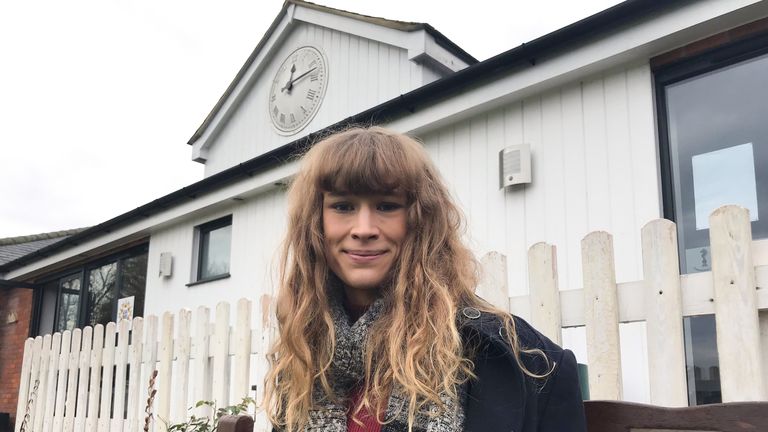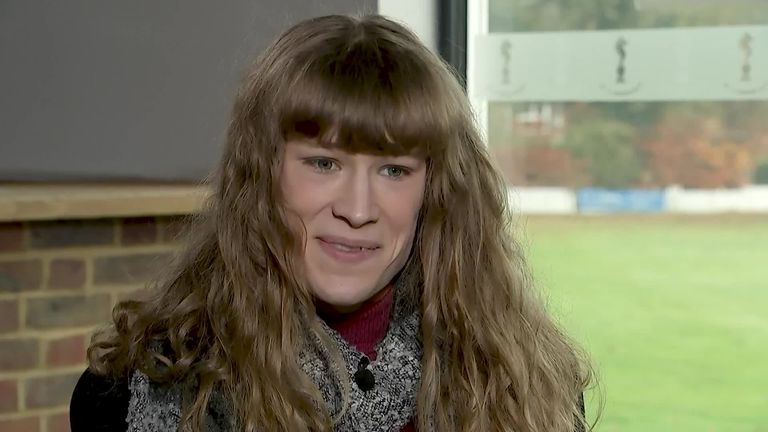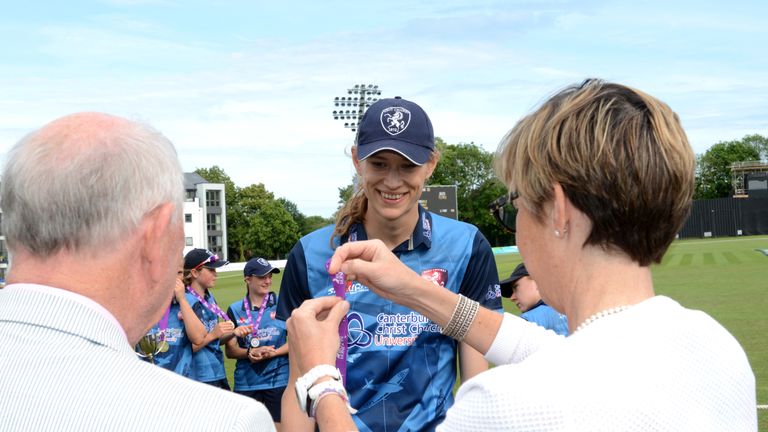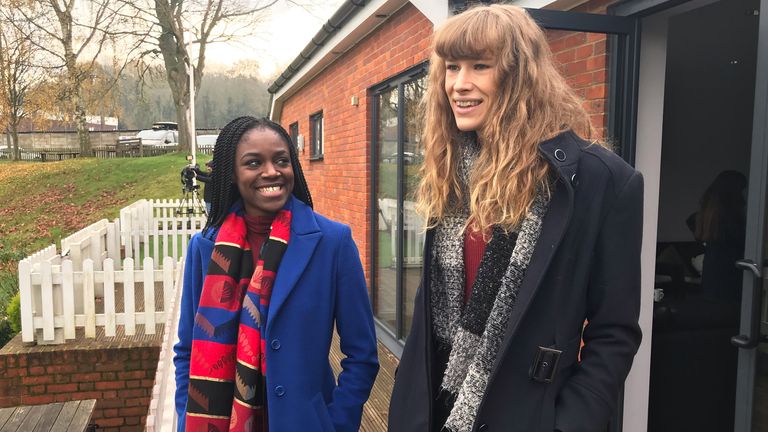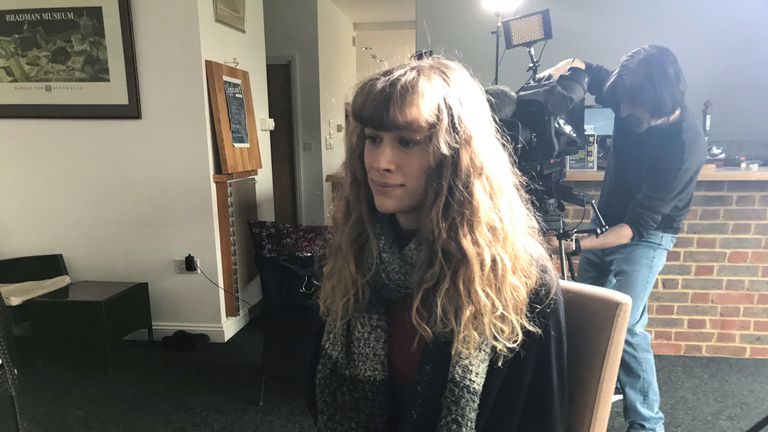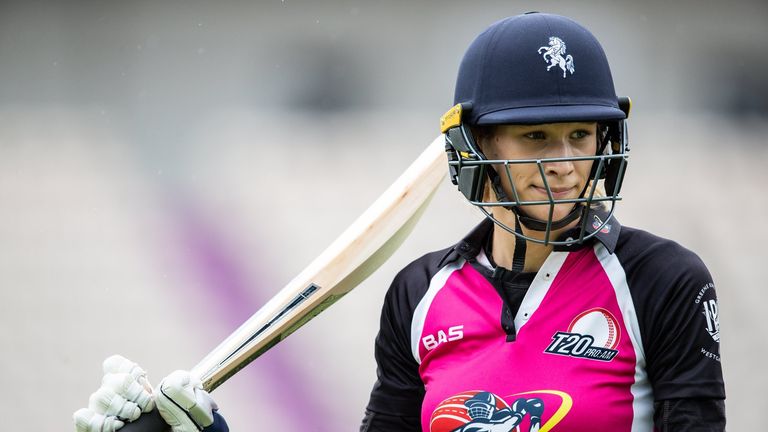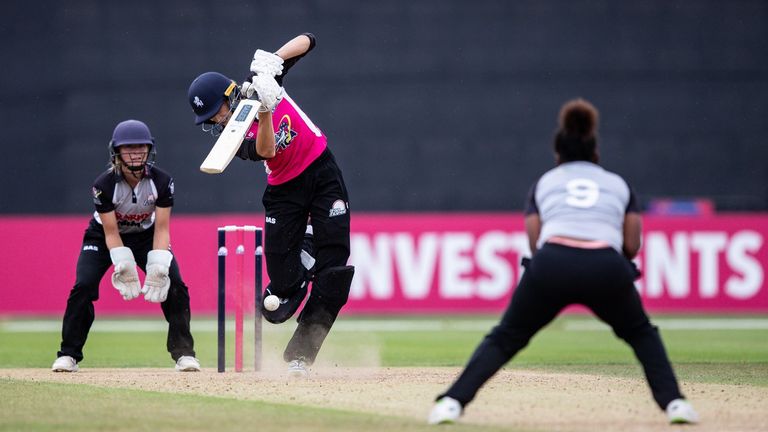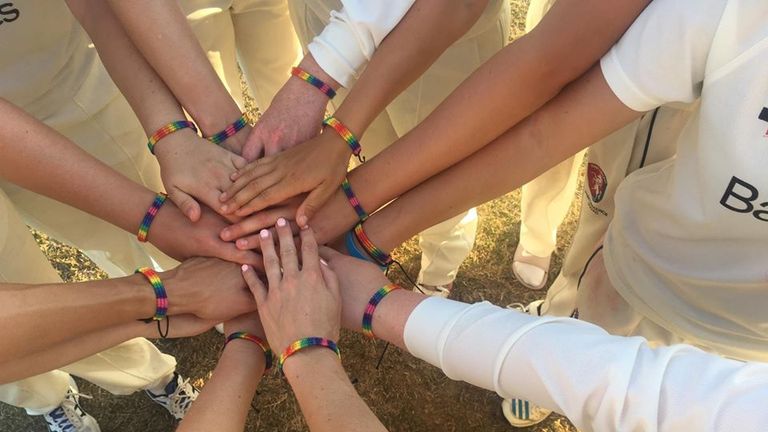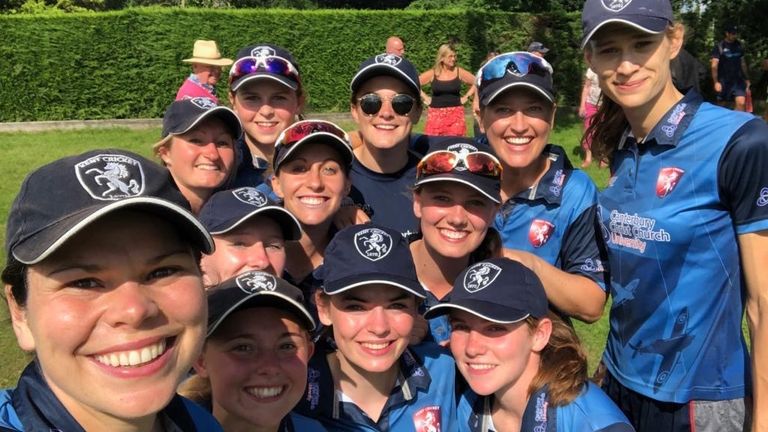Maxine Blythin: Transgender player grateful for 'supportive' cricket family
When Kent Women's Maxine Blythin was outed as transgender, her team-mates and the wider cricket community rallied around her. In her first interview, she discusses harassment and happier times - and how she would react to an England call-up
Sunday 1 December 2019 18:34, UK
One of the most talked-about women in British sport is explaining herself - even though Maxine Blythin doesn't owe anyone an explanation.
Nor can she definitively answer every question that might be asked of her. Yet she wants to help people understand more about who she is. "I had to educate myself," she says. "Getting and sharing that knowledge is important - but being able to articulate it is a challenge."
Blythin is a cricketer with Kent Women who is transgender. After being publicly outed three months ago, she discovered that many people had already made up their minds about her identity and her intentions in sport before she even had a chance to speak.
Abuse and harassment - even threats of violence - have ensued. After another recent round of half-truths, amplified by the media personality Katie Hopkins and others who oppose her playing competitive women's cricket, she simply wants space to tell her story.
It starts with a birth condition. When puberty failed to commence in adolescence, a variation in Blythin's biology became apparent for the first time. Test results showed the teenager's body was not producing testosterone at the expected level. She has not been given a medical diagnosis of a DSD (difference of sexual development) - also known as an intersex condition - but she may yet receive such a diagnosis in the future.
Blythin's narrative also features another condition, gender dysphoria, a constant state of internal distress from "before I can remember other memories".
She shares this personal information - talking to Sky Sports on a cold autumnal morning at her local cricket club in Buckinghamshire - because her prowess in cricket has put her in the spotlight and intensified wider debate on the inclusion of trans women in sport.
She has become a case study out of context, in a sport she loves and has played throughout her young life. In her debut Women's County Championship season this year, she was Kent's third-highest run scorer as they coasted to the title. Casual observers have attempted to analyse those achievements, based upon perceived advantages of Blythin's physique and biology, highlighting disparities in statistics from 'open' cricket - in which women often play in men's teams - and women-only cricket.
Those who self-identify as trans women without medical intervention - known as a social transition - are eligible to play women's cricket at a domestic level under the ECB's trans inclusion policy. Blythin's naturally low testosterone level means she would also be eligible under more stringent sports policies, such as that of the ICC.
She describes her experience. "Every trans person's story I listen to and hear is different. None are the same as mine, none are the same as each other's.
"Some trans people don't want to go through any medical intervention. For them, it's a social transition. For others, it involves various levels of medical interventions - such as getting their testosterone decreased, or having oestrogen to go through a female puberty.
"That's what I wanted because I hadn't gone through any puberty, so female puberty felt more in line for what works with me."
Pressure points
Growing up near Canterbury, there was always a sense of discomfort. "The first thing I can remember as a kid is thinking that way. I always had that feeling of being different but without the knowledge.
"Trans people were still the butt of jokes in mainstream media back then. You didn't have trans role models or anything like that so being able to articulate who you are was not easy to do."
The onset of pre-adulthood heightened Blythin's distress. "I've always known who I was but that became a challenge, particularly in the early teenage years, where there was a lot of social pressure from friends, and a lot of stigma.
"That's sometimes part of the reason why it's harder to explain your feelings when you're old enough to be able to tell people. When you do gain the language, you've got to battle the stigma.
"I went with it, eventually. It's the same with a lot of trans people. You can't keep it forever, otherwise it just eats at you."
Back then, she would have struggled to explain what gender dysphoria felt like. Even now, she says describing it fails to convey the pain. "It's a feeling of disgust, a really hurtful feeling. It's hard for someone who's cisgender to really get that.
"My best way is to ask what makes a man. If you come back and tell me it's what's in your trousers, you've not grasped what being a man is. You have to look inside yourself and really think. Now, imagine you're a man in a woman's body - but you're still thinking about what makes you who you are.
"To then have that body stare back at you in the mirror... that's the easiest way to explain it."
Accepting that you only get one opportunity to live the life you want was the turning point for Blythin. "I'd been to visit an elderly relative. I was in this care home with all these elderly people who you could tell had lived very contentful lives. I had a complete mental breakdown.
"I was still quite a young teenager at the time. I knew I had to find someone to tell and say that I didn't want to live my life and get to that point, and not have been able to tell people who I was."
Life, love and cricket
While she talks, a function is being prepared in an adjacent room at the cricket club. Blythin and her fiancée Katie are taking a keen interest in event planning, with their wedding on the horizon. "We're getting ready - sealing the date soon, hopefully," she smiles. "It's exciting times."
Katie was the first person whom Blythin told that she was trans. "She helped me gain the confidence to tell my family. They were always supportive of people being gay, or other things, but being trans was just not on their radar.
"I didn't know anyone going through a similar story to me. The internet was only really kicking in at that kind of time, so my knowledge base on being able to explain it was very tough. But she gave me the confidence to try."
They have been together for almost a decade. Meeting them in person, the height gap is hard to ignore - Maxine is over 6ft, a fact referenced in almost every article that has been written about her. She says being tall runs in the Blythin family - alongside her mum, dad and sister, she describes herself as "quite normal-sized". There may be another explanation too. "There are intersex conditions that can cause you to be a little taller," she notes.
They all share a passion for cricket; Blythin has been playing ever since her school days. Being out on the field has always felt welcoming and familiar, a place where she could focus. In the classroom, science lessons didn't extend as far as her condition. "Biology was taught very binary. Even now, schools are struggling to teach it correctly."
She appreciates how discussions of transgender identities and intersex variations can be daunting, not just for people like her, but often for others too. "You have to change people's perceptions of you and your gender. Because when you're born, you're assigned a gender. It's something that a nurse gives to you, and then you are raised in that. It doesn't necessarily have to be how your chromosomes are aligned. They don't test your chromosomes when you're born."
Yet it has never felt essential to Blythin to have a full medical diagnosis for herself. "Answers may never come out as to why. For me, that's OK. I don't need to know the answers. I don't feel like it makes a difference to my life. All I know is the effects of what it is - a lack of testosterone - but it doesn't necessarily explain who I am, it doesn't necessarily decide the fact that I'm trans."
It's only the steady stream of inaccuracies written and spoken about her since August that have brought her back into conversations with doctors. "We've got good ideas of what it could be, and we're going to target those first."
On that late summer Sunday, when the first national newspaper article about her being trans was published, she was playing cricket with friends. "I wasn't actually able to tell them what was going on. I was still in this processing stage of thinking 'I don't know how to deal with this'.
"I told them afterwards. The next game, they all wore rainbow laces. It was a nice occasion. I was speaking with the other team as well, and they were all really supportive."
Had she spoken with any of her team-mates before about being trans? "I was just one of the girls. I didn't really share my story too much. I'd played with a lot of them before in club cricket, so it wasn't like they didn't know who I was. It's never something I go out shouting about.
"It was only because it was printed in various papers that I mentioned it. I made a club announcement and I shared my story in the same way I'm telling you now - that I have a condition, and I'm eligible to play at any level." And what was the reaction? "General support. They've been great."
Prejudice and pride
She describes herself as "strong-willed", a valuable quality for a cricketer facing an onslaught of deliveries over a sustained period. "I don't take people's opinions to heart." But the weight of invective about her, particularly on social media, has been "tiring" to bear, while also "frustrating" for the effect it has had on loved ones.
"They just have to sit there and see it unfold. They know whatever reaction they have is not going to help matters. It will only ever inflame. And for my parents, it's seeing their child being openly subjected to abuse from high-profile people."
Hopkins, Julia Hartley-Brewer, Piers Morgan, other newspaper columnists, and campaign groups have all commented on Blythin. "They don't even know who I am, or anything about me." It took over a month for news of her Kent club award to form part of the debate, leading to another spate on Twitter of mass misgendering. "It's the hardest thing for someone like me to experience, because it's someone saying you are not valid - they're saying, 'I get to decide who you are, not you', without any understanding of the biology behind it."
Some of those tweets were reported to Twitter under the platform's hateful conduct policy, and were subsequently removed, including the one posted by Hopkins to her 1m followers. Blythin's club captain at Kent, Tammy Beaumont, replied to Hopkins in defence of her team-mate, as did Hampshire's Fi Morris and other players.
Blythin admires them all - "it's brave to stand up in the social media space, which is very critical" - and says their interventions are reflective of the sport as whole. "Women's cricket is a very welcoming and inviting place. I've never had any negativity on a sporting pitch ever, no on-field conflicts or anything like that. I only have friends that I've made through cricket."
Offline, there has also been targeted abuse and harassment too. "You get a lot of hate mail, and bits in between - some more extreme than others. To have someone who's never seen you play, never been to a women's sport game, never even seen cricket, threaten you for just playing on a pitch, miles away from them... it just blows my mind."
Meanwhile, indoor training continues for those Kent players who have not headed to sunnier climes to play their cricket during the winter. With the volume dialled down, Blythin wants to take this window of opportunity to present her lived experience; she says the ECB and Kent have been "fantastically supportive" in that regard. "I don't want to be just a submarine and live under the surface. People need to see that you can be different, it's not a binary world."
Her low testosterone levels suggest she would be approved to play at international level by the ICC if she were ever selected for England duty. Would she accept a call-up? "It would be the biggest privilege of my life. I'm not expecting it, but I would say yes."
More immediately, she is expecting to field a flurry of further interview requests. She is prepared for that. "I'm very happy with who I am, and I hope being able to say that makes a difference to somebody. Even just one person would be nice. It's OK to be different."
And how will she describe herself when asked? "A woman. Simple as. I always have felt that way. And I always wanted to articulate it as such."
Watch Maxine Blythin's exclusive interview on Sportswomen, available On Demand.
For more information about gender dysphoria and being transgender, and also intersex conditions, see the relevant sections on the NHS UK website.
Sky offers support for our viewers on a broad range of topics, including feelings of distress and despair, and gender identity. Find out more here.
